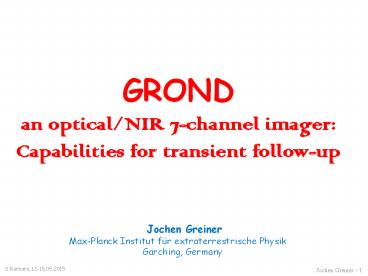Jochen Greiner - 1 - PowerPoint PPT Presentation
1 / 17
Title:
Jochen Greiner - 1
Description:
Title: Afterglows of Fermi bursts Author: Jochen Greiner Last modified by: jcg Created Date: 2/5/1999 3:33:22 PM Document presentation format: Bildschirmpr sentation ... – PowerPoint PPT presentation
Number of Views:199
Avg rating:3.0/5.0
Title: Jochen Greiner - 1
1
GROND an optical/NIR 7-channel
imager Capabilities for transient follow-up
Jochen Greiner Max-Planck Institut für
extraterrestrische Physik Garching, Germany
2
GRB Afterglow and Light Curve
Afterglow emission at radio, optical, and NIR
wavelengths
12 hrs
2 hrs
48 hrs
3
Quickly finding high-redshift GRBs
- Due to characteristic powerlaw spectrum of GRB
Afterglow - Derive redshifts from simultaneous photometry in
7 filters.
4
GRONDGRB Optical/NIR Detector
Imaging in 7 channels simultaneously
5
GROND _at_ 2.2m MPI telescope (La Silla)
History First light Apr 30, 2007
First GRB May 21, 2007 Photometric
calibration Jul 2007 Routine observations
since Sep 2007 fastest response time 2 min
H
K
J
Electronics
M3
cryostat
d-twister
cryostat
GROND
6
GROND General Design
- 7 bands Sloan g, r, i, z and J, H, K One
detector for one filter band (no movable
filters!) 3 HAWAII 1K1K Arrays 4 E2V
2K2K CCDs - Field-of-view Visual 5.4x5.4
(0.16/pixel) NIR 10x10
(0.59/pixel) - Dichroics tuned to minimize intrinsic
polarization effects - 2 shutters, i.e. gr and iz pairs of CCDs have
same exposure - Combined telescope and intrinsic mirror (K-band)
dithering - Sensitivity 4 min 1 hr gr 22.0
mag 25.0 mag (AB) iz 21.5 mag 24.5 mag
(AB) J/H/K 20/19.5/19 mag 23/22.5/22 mag (AB)
7
Example of GROND sensitivity
- 7 filter bands cover Lyman-a for large z-range
3ltzlt13 - GROND has proper z-band sensitivity to define
drop-out for z8
Advantage of separate detector per filter can
add sensibilization for spectral band ?
GROND_at_2.2m detector/filter is 4x more sensitive
than FORS2 ? total efficiency only 4x less
than FORS2, not 16 (8.22/2.22)
8
Photometric redshifts for GRBs
GRB 080913 at redshift 6.7
1st exposure starts T06 min T015 min XRT
position T035 min first SED (S of 3 OBs 16
min expo) T090 min VLT starts taking spectrum
with proper grism (5 mag fainter than 050904)
Greiner et al. 2009
9
Combined GROND-Swift/XRT SEDs
Some GRB afterglow SEDs extend from 240 nm to 10
keV with single power law most with slope break
of 0.5 in both cases sensitive to extinction AV
and/or Ly-break
Greiner et al. 2011
KHJ zirg
KHJ zirg
0.2-10 keV
GRB 080710
GRB 070802
10
Seeing dust in SEDs
GRB 070802 first 2200 A bump at z2.45
Krühler et al. 2008
SED at 2000 sec after GRB
11
SEDs every minute
GRB 071031
First image 4 min after GRB onset, 80 sec
after trigger 1st night 6 hrs continuous
exposure 350 data points ß-evolution (instead of
one for all AG)
Krühler et al. 2008
12
Chromatic flares
GRB 080129
GRB 081029
Nardini et al. 2012
Greiner et al. 2009
13
Multi-filter light curves
SN 2009mg
Pulsar Fermi J1311-3430
WASP-4
Porb 93 min
Romani2012
Nikolov2012
14
Recognize thermal transients
- With 7 filter bands you always get an SED
- Transient classification according to SED allows
to distinguish other types of transients, e.g.
accretion-disk dominated galactic transients
GRB 100331A? likely galactic transient
15
Contemporaneous UV-NIR SEDs of blazars
- gt100 observed in 1 yr
- doubled of known BL Lac at zgt1.2
- High-z BL Lacs interesting for various
applications, e.g. EBL studies
Rau et al. 2011.
16
(No Transcript)
17
Transient follow-up
- GROND is built for rapid (min), automatic
response - Simultaneous 7-filter broad-band coverage is
helpful for identification - Particularly advantageous for color changes along
with intensity changes - GROND science goals include transients of all
kindsuse for GRBs is being reduced - Presently contracted telescope access until 9/2016































